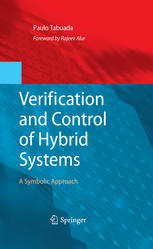

Most ebook files are in PDF format, so you can easily read them using various software such as Foxit Reader or directly on the Google Chrome browser.
Some ebook files are released by publishers in other formats such as .awz, .mobi, .epub, .fb2, etc. You may need to install specific software to read these formats on mobile/PC, such as Calibre.
Please read the tutorial at this link: https://ebookbell.com/faq
We offer FREE conversion to the popular formats you request; however, this may take some time. Therefore, right after payment, please email us, and we will try to provide the service as quickly as possible.
For some exceptional file formats or broken links (if any), please refrain from opening any disputes. Instead, email us first, and we will try to assist within a maximum of 6 hours.
EbookBell Team

0.0
0 reviewsHybrid systems describe the interaction of software, modeled by finite-state systems such as finite-state machines, with the physical world, described by infinite-state systems such as differential equations. Verification and Control of Hybrid Systems provides a unique systematic exposition of several classes of hybrid systems, admitting symbolic models along with the relationships between them. The text outlines several key verification and control synthesis results for hybrid systems, guided by the concept of bisimulation, and illustrated by numerous examples.
The book is divided into four parts:
Part I presents basic concepts centered on a notion of system that is general enough to describe finite-state, infinite-state, and hybrid systems.
Part II discusses the ways in which systems relate to other systems, such as behavioral inclusion/equivalence and simulation/bisimulation, using these relationships to study verification and control synthesis problems for finite-state systems.
Part III draws inspiration from timed automata to present several classes of hybrid systems, with richer continuous dynamics, that can be related to finite-state symbolic systems. Once such relationships are established, verification and control synthesis problems for these hybrid systems can be immediately solved by resorting to the techniques described in Part II for finite-state systems.
Part IV follows the same strategy by generalizing simulation/bisimulation relationships to approximate simulation/bisimulation relationships that can be used for a wider class of hybrid systems.
This comprehensive treatment will appeal to researchers, engineers, computer scientists, and graduate students in the areas of formal methods, verification, model checking, and control and will undoubtedly inspire further study of the specialized literature.